Bhishma Pitamah was the great Grand Uncle of Kauravas and Pandavas. He was the unparalleled archer and warrior of his time. He even defeated his Guru Parashurama. After the Kurukshetra war, he gave all his teaching to Yudhisthir and also perched him the famous Vishnu Sahasranama.
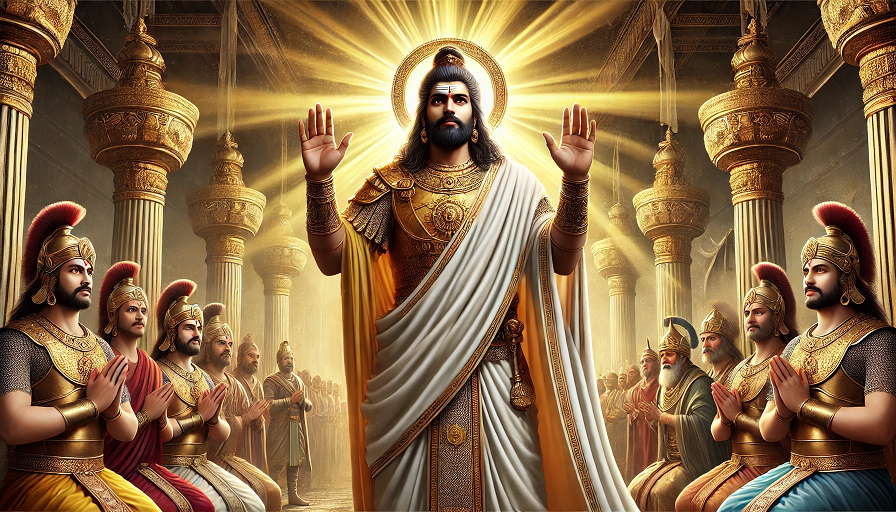
Birth of Devavrata
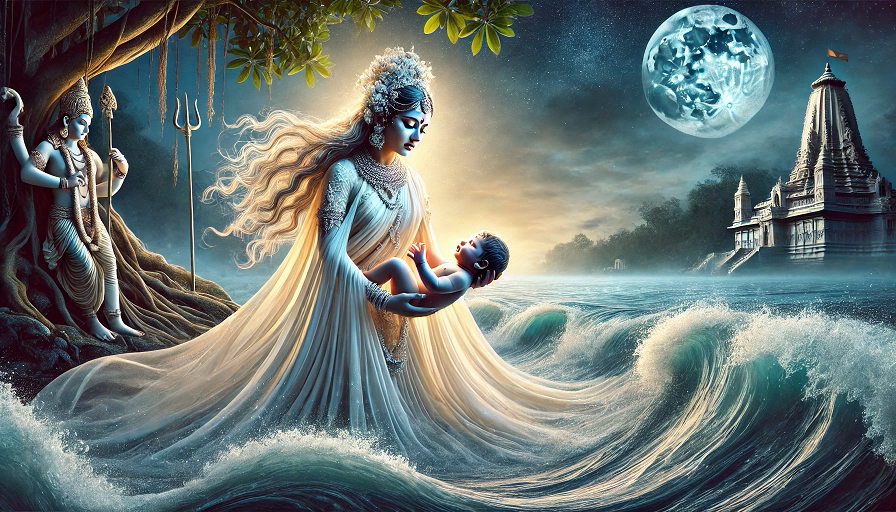
Shantanu, the Kuru king, married the river goddess Ganga on the condition that he would never question her actions nor stop her from doing anything. Some years passed, and Ganga became pregnant. After giving birth to her first child, she went straight to the river and drowned him. She did the same with her next six sons. Shantanu, bound by his promise, did not question her actions but was deeply pained watching his seven sons being drowned in the river.
When their eighth son was born, Shantanu could no longer remain silent. He broke his promise and asked Ganga to stop what she was doing. As the promise was broken, Ganga decided to leave Shantanu. However, she spared their eighth son and promised to return him to Shantanu after giving him all the necessary education. She named him Devavrata.
This Devavrata was one of the eight Vasus, who had to be born as a human due to a curse from Rishi Vashishtha.
Who were Devavrata’s Gurus?
According to Shanti Parva in Mahabharat, after Devavrata’s birth, Ganga took him to many renowned Sages to gain different knowledge.
- Brihaspati: Bhishma learned the duties of kings (Dandaneeti), or political science and other Shastras from Brihaspati.
- Shukracharya: Learned political science and other branches of knowledge from him.
- Vashishtha: taught Devavrata, the Vedangas, and other holy scriptures.
- Sanatkumara: From this great Rishi, Devavrata learned spirituality, morality, and the path to liberation.
- Markandeya: Sage Markandeya provided Bhishma with insights into dharma, devotion, and the duties of a Kshatriya (warrior).
- Parashurama: Bhishma learned advanced warfare and the mastery of divine weapons from Parashurama.
Devavrata became Bhishma
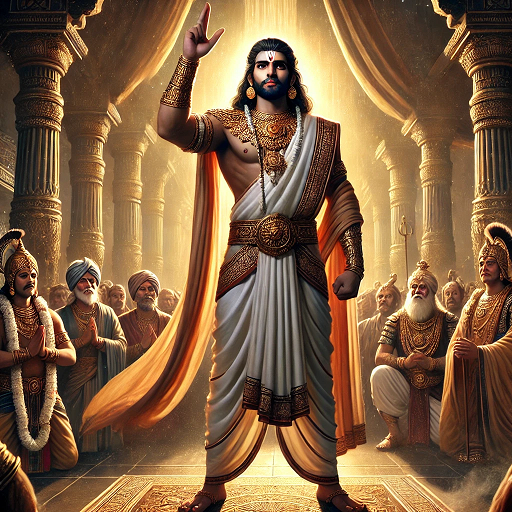
After completing his education, Ganga returned Devavrata to his father, Shantanu. By then, Devavrata had mastered the Vedas and was a highly skilled warrior, unparalleled in his time. Shantanu was overjoyed to see him and declared him the crown prince. However, because Shantanu had broken his promise to Ganga, she never stayed with him or Devavrata and returned to her heavenly abode.
Later, Shantanu wished to marry a fisherwoman named Satyavati. However, her father placed a condition: only the sons born to Satyavati would inherit the throne. Shantanu, bound by his sense of duty to his existing lineage, refused and became deeply despondent.
When Devavrata learned the reason for his father’s sadness, he went to Satyavati’s father and took two solemn vows. First, he renounced his position as crown prince, ensuring that Satyavati’s sons would inherit the throne. took a vow for lifelong celibacy, to prevent any challenge to their succession. To make sure the Kingdom runs smoothly evenif the king wasn’t that capable, he took another vow to lifelong remain in the service of the throne.
These terrible vows earned him the name Bhishma, which means “the one who took terrible vows.”
As a reward for his sacrifice, Shantanu blessed Bhishma with the boon of Iccha Mrityu—the ability to choose the time and place of his own death.
Amba’s Vow
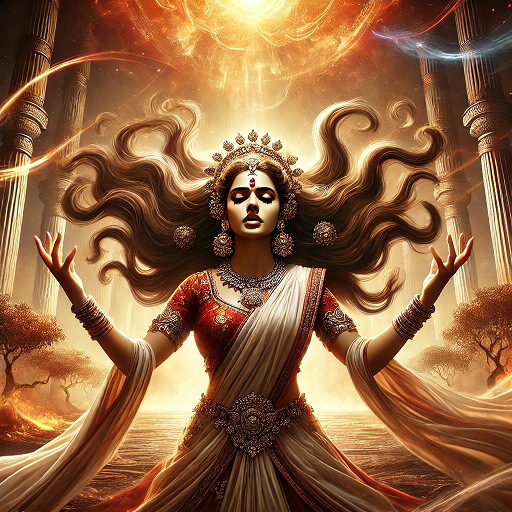
Years after when Bhishma’s step brother Vichitravirya became a King. In process to find him a Queen, Bhishma abducted Kashi Princesses Amba. Ambika and Amnalika. The eldest princess Amba and Salwa, the ruler of Saubala were in love. So Salwa tried to stop abduction but Bhishma defeated him.
Upon reaching Hastinapur, Amba confessed her love for Salwa. Bhishma then sent her back to Salwa, who, bitter from his humiliating defeat at Bhishma’s hands, turned her down. Disgraced Amba asked Bhishma to marry her, as he was the reason for her condition. Bhishma politly refused because of his Oath. Now enraged Amba, vowed avenge herself against Bhishma even if it meant being reborn over and over again.
She approached Parashurama, who ordered Bhishma to marry Amba, stating that it was his duty. They fought for 23 days without a decisive outcome. Determined to take revenge, Amba performed severe penance to please Lord Shiva. Pleased with her devotion, Lord Shiva assured her that she would be reborn as a man named Shikhandi in her next life (retaining the memories of her past) and would play a crucial role in Bhishma’s death, thus fulfilling her vow.
Bhishma in the Kurukshetra War
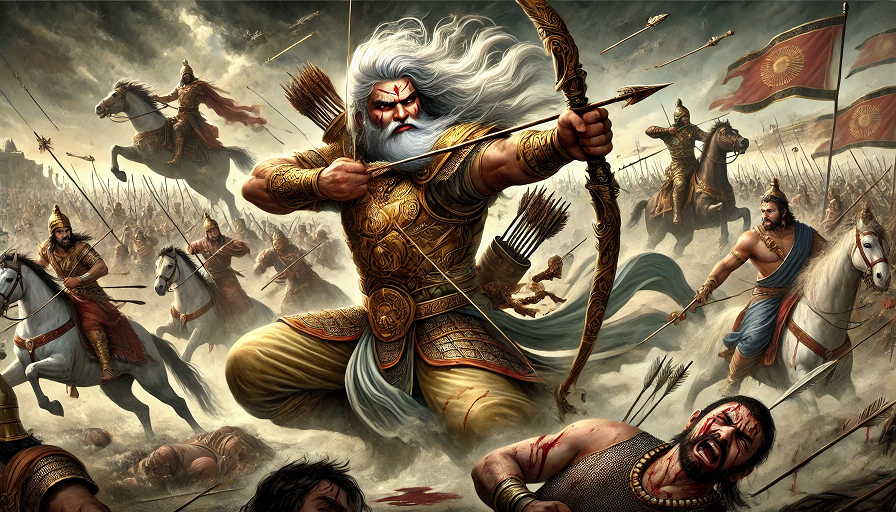
Bhishma was the Commander-in-Chief of the Kaurava army for 10 days. He was an exceptionally powerful and the greatest warrior of his time. Despite being five generations old, no one was able to defeat him. Every day, he was slaying 10,000 foot soldiers and 1,000 horse riders of the Pandava army. Before the war, he vowed not to kill any of the Pandavas as they were dear to him.
Duryodhana accused him of not fighting with his full strength because of his affection for the Pandavas. In response, Bhishma vowed that the next day he would either kill Arjuna or make Lord Krishna break his vow of not picking up any weapons. The next day Intense battle between Bhishma and Arjuna happened. Even though being so powerful Arjuna wasn’t a match for Bhishma. As Bhishma was about to kill Arjuna with his arrows, Sri Krishna who took a vow of not to raise a weapon in the war, lifted a chariot wheel and threatened Bhishma.. Arjuna stopped Lord Krishna and promised to fight with full determination. Thus, Bhishma fulfilled his vow.
Later, Krishna suggested to Arjuna how he could defeat Bhishma with the help of Shikhandi. Bhishma did not fight against Shikhandi, and Arjuna placed him on a bed of arrows.
On the bed of Arrows
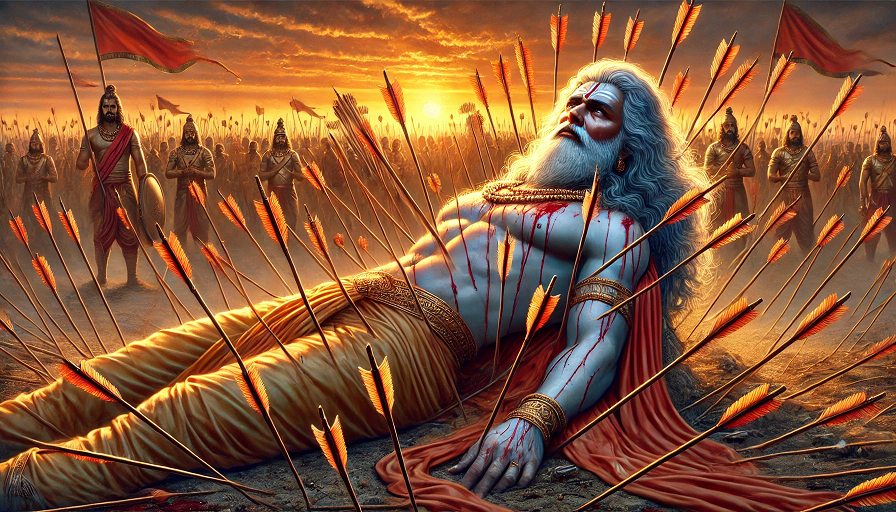
After the Kurukshetra war, while on his deathbed (arrow bed), Bhishma gave deep and meaningful instructions to Yudhishthira on statesmanship and the duties of a king. He also preached the Vishnu Sahasranama to Yudhishthira. He waited 58 days for the winter solstice, or the first day of Uttarayana, to give up his body on the arrow bed.
The Mahabharata states that he attained salvation after his death. He was granted the Maatru Lok (considered even above Vaikuntha Dham). The Shukla Ashtami of the month of Magha marks the death anniversary of Bhishma Pitamah (Father), and the day is known as Bhishma Ashtami.
At Last…
Bhishma’s life was a fierce struggle between the path of Dharma and his vows. He always tried to remain on the path of Dharma. His life is a great example of devotion and sacrifice.

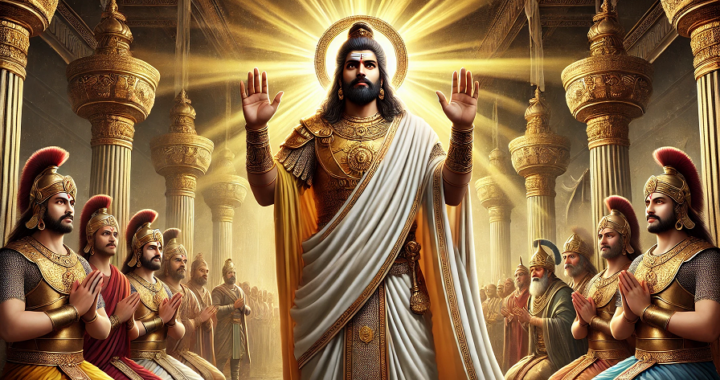
Pingback: Jaya to Mahabharat : Different names of the great Saga - BrowsingIndia